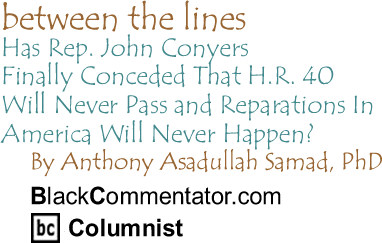
|
||||||||||||||||||||||
|
||||
 |
||||
In the time of extreme unemployment for African Americans and disproportionate representation among America�s health care uninsured, the vestiges of slavery, ending 144 years ago, and de jure segregation, just a mere 45 years ago, are being perpetually manifested throughout the nation. At a time when America has its first African American President, it is more than ironic that the absence of wealth, work, educational and economic capacity that was historically withdrawn during these racial periods in America�s history, go unaddressed at a salience level lower than previous Presidents.
Conyers, deeply embroiled in the fight to pass universal health care with a public option, is recently quoted as saying the reparations issue is �too controversial� to pursue at this time. Twenty years ago, a national discussion around reparations for the descendants of the enslaved began in the aftermath of the Reagan �revolution� that stripped the black community of wealth, work and access (the deconstruction of Affirmative Action) that sent unemployment and poverty rates souring to similar levels we see today. In January of 1989, Representative Conyers introduced House of Representative bill 40, �Commission to Study Reparations Proposals for African Americans Act,� for the purposes of study whether descendants of slaves during America�s formalized slavery period (1619-1865) are entitled to reparations as well as to look at the wealth and opportunities denied to African Americans during America�s legalized segregation era (1896-1964). Conyers
has introduced the bill every two years since and the bill usually
gets stalled in a sub-committee, usually the Sub-committee on the
Constitution, Civil Rights and Civil Liberties. Conyers introduced
the bill again this year, in January, with 24 co-sponsors, to the
House Judiciary Committee. and as Chairman of the Committee on the
Judiciary, there was hope that the bill would finally get out of
committee and on to the House floor for some serious debate. Conyers, now 80 years old, in an interview with TheHill.com, a Washington D.C. based on-line newsletter and blog, suggested that his on-going battles with President Obama and the hyper-sensitive environment around passing health care reform are his foremost legislative priorities. The Hill.com (www.thehill.com) cites Conyers has �abandoned hope� of moving his legislation on establishing a commission to study reparations for descendants of slaves. They quote him as saying reparations is �too controversial.� More controversial than health care reform or a war in Afghanistan? Yep. After all, we�re living in �Post-Racial� America. Reparations
is bland reminder of �Racial Americana� and in the age of Obama,
we�re even now, right? Moreover, reparations is being traded out
for health care - the ultimate horse trade. Conyers is not going
to raise reparations with universal health care hanging in the balance.
And given that Obama and Conyers are on the outs, factor into the
political equation if the President would even sign Conyers� bill
anyway (if it got that far - we know it would be filibustered in
the Senate). Still, it�s disheartening to see Conyers softening
on his stance on studying reparations. Still, I find it odd that we would get soft on the reparations discussion during the Presidency of a black man. That would be the ultimate test for Obama, and of course, the ultimate test of integrity for America. But now that reality has set in, it is the ultimate test for the black community not to let the conversation die. Injustice needs to be rectified, whether it occurred 144 years ago or 144 days ago. Someone in Congress, or somewhere else, needs to pick up the reparations baton Conyers is preparing to drop. BlackCommentator.com Columnist, Dr. Anthony Asadullah Samad, is a national columnist, managing director of the Urban Issues Forum and author of Saving The Race: Empowerment Through Wisdom. His Website is AnthonySamad.com. Click here to contact Dr. Samad. |
||||
 |
||||
If you would like to comment on this article, please do so below. There is a 400 character limit. You do not need a FaceBook account. Your comment will be posted here on BC instantly. Thanks. Entering your email address is not mandatory. You may also choose to enter only your first name and your location.
|
||||
Thank you very much for your readership. |
||||
| Any BlackCommentator.com article may be re-printed so long as it is re-printed in its entirety and full credit given to the author and www.BlackCommentator.com. If the re-print is on the Internet we additionally request a link back to the original piece on our Website. | ||||
| |
||||
| December 10 , 2009 Issue 354 |
| Executive Editor: Bill Fletcher, Jr. |
| Managing Editor: Nancy Littlefield |
| Publisher: Peter Gamble |
| Est. April 5, 2002 |
| Printer Friendly Version in resizeable plain text format |
 |
 |

|
 |
| |
| |

































 However,
reparations is often seen as the issue that will create the next
civil war. America doesn�t want to pay reparation, because the number
is incalculable, so why even discuss it. The House of Representatives
did issue an apology for slavery in 2008, but specifically stated
that it would not consider reparations and the apology was not to
suggest that America owed African Americans anything more than �an
apology.� Well, we certainly know that�s not true, however, likelihood
of descendants of slaves having a �day in court� stayed alive as
long as HR 40 stayed alive.
However,
reparations is often seen as the issue that will create the next
civil war. America doesn�t want to pay reparation, because the number
is incalculable, so why even discuss it. The House of Representatives
did issue an apology for slavery in 2008, but specifically stated
that it would not consider reparations and the apology was not to
suggest that America owed African Americans anything more than �an
apology.� Well, we certainly know that�s not true, however, likelihood
of descendants of slaves having a �day in court� stayed alive as
long as HR 40 stayed alive.










